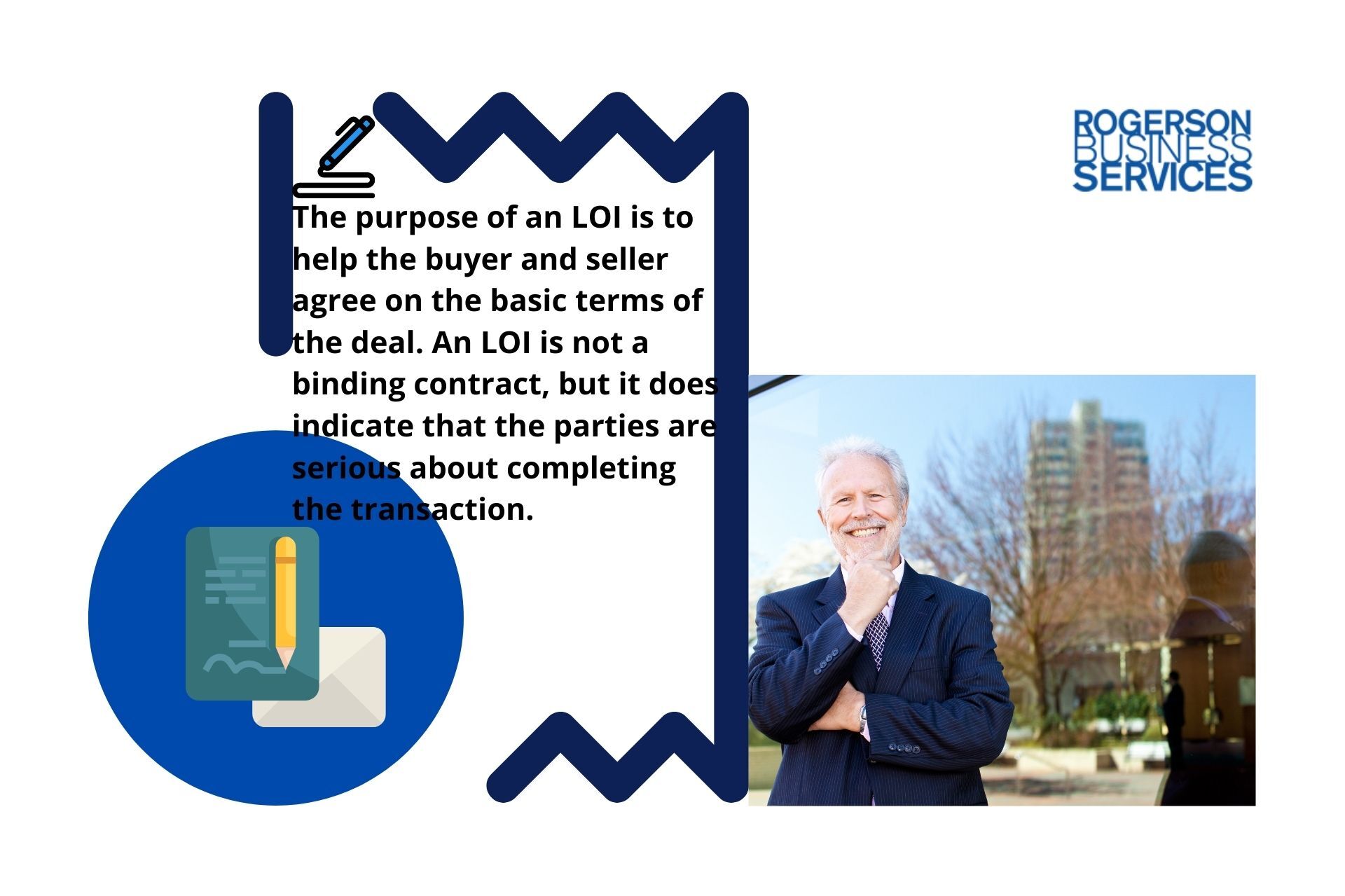Letter of Intent to Sell a Business | Issues to Consider Before Signing
Letter of Intent to Sell a Business
Many business owners are not aware that a Letter of Intent must be signed before selling their business in California. This document outlines the key terms and conditions for purchasing a lower middle market business, so it's important to consider everything carefully!

The Letter of Intent (LOI) is a document needed when selling a lower middle market business in California. There are several things to consider before signing a Letter of Intent. An LOI is a document that outlines the key terms of the sale.
Many clauses go on this type of business letter so let's take the time to get more oversight over such an important document. It is an important part of the checklist for selling a business.
What is an LOI
An LOI is a document that outlines the key terms of the sale. Don't rush through this process, and take the time to understand all of the implications. The purpose of an LOI is to help the buyer and seller agree on the basic terms of the deal. An LOI is not a binding contract, but it does indicate that the parties are serious about completing the transaction.
When you sign an LOI, you agree to negotiate in good faith and enter into a formal purchase agreement once the terms have been finalized. You should be aware that the LOI terms of an agreement can be terminated by either party at any time, as well.
Letter of Intent to Sell a Business
When you're reviewing an LOI, there are a few key things to look for:
1. The Purchase Price
One of the most necessary terms in an LOI is the purchase price. The purchase price should be fair and market-based. When coming up with the sale price for your business, make sure you base it on realistic assumptions. There should not be any hidden agenda on the part of the seller.
2. The Closing Date
Another important term to look for in an LOI is the closing date. The closing date should be realistic and allow enough time for the parties to complete their due diligence and closing letter. The closing date should also be far enough in the future so that there is no rush to complete the transaction.
3. The Conditions of Sale
Make sure the conditions of sale are outlined clearly in the LOI. A vital condition of sale is the due diligence period. The due diligence period is the time during which the buyer can conduct their investigation into the business. This article goes further in-depth about due diligence below.
4. Representations and Warranties
The seller is responsible for ensuring that all of the representations and warranties in the LOI are true and accurate. If the seller fails to live up to their obligations, it may result in liability for damages.
5. Indemnities of the Seller
The indemnities of the seller protect the buyer from any losses or damages that result from the sale.
6. The Arbitration Clause
The arbitration clause allows the parties to resolve disputes through arbitration. The arbitration will prevent both parties from going through the courts. It can be a more efficient and cost-effective way to resolve issues.
7. Confidentiality Clause
The confidentiality clause protects the confidential information of the seller. The buyer should not disclose any confidential information about the business without the consent of the seller.
8. The Termination Clause
The termination clause allows either party to terminate the LOI for any reason. It gives the parties a way to end the transaction if it's not working out.
9. The Governing Law
The governing law is the law that will govern the transaction and is specified in the LOI.
10. Signature Blocks
The signature blocks indicate that both parties have read and agreed to the terms of the LOI.
11. Debt
Who is responsible for the debt of the business? The seller is typically responsible for any outstanding debt. The buyer should be aware of any outstanding liabilities and make sure they can cover those debts.
12. Taxes
What happens to the taxes of the business? The seller is typically responsible for any outstanding business taxes. The buyer should be aware of any outstanding liabilities and be prepared to cover any taxes.
13. Employees
The buyer is typically responsible for the employees of the business. The buyer should be aware of any employment contracts and make sure that they can cover any liabilities related to the employees. After the acquisition of a business, the buyer must be aware that employees have rights.
14. Non-compete Agreement
The buyer may ask the seller to sign a non-compete agreement. This agreement prohibits the seller from competing with the buyer for a specific time after the sale is completed.
15. Intellectual Property
What happens to the intellectual property of the business? The seller should transfer the intellectual property of the business to the buyer at the closing.
What To Expect During Due Diligence
During a business sale, the buyer will typically conduct their due diligence into the company. It is a process during which the buyer can investigate the business to ensure it is in good condition and there are no hidden risks or liabilities. The buyer should also conduct due diligence when selling a business.
The buyer will need to review the financial statements of the business. They will also look at any contracts or agreements that are in place. The buyer may also want to speak with the employees and conduct an on-site inspection. When the sale includes a building, the buyer may also want to review the property title.
The seller's due diligence involves cooperating with the buyer during the due diligence process. They should provide all of the information the buyer requests and be available for interviews.
The buyer will typically have a period (usually 30-60 days) to conduct their due diligence. Once the buyer has completed their due diligence, they will submit a report to the seller outlining their findings.
Conclusion
If you want to sell your lower middle market business in California, get an experienced professional to help you with the sell-side M&A process. Selling a business can be difficult, but with the help of an expert, you can make the process much smoother.
When selling a business, you must consider all of the potential issues that may arise. The LOI document is a contract that outlines the terms of the sale. Review the LOI carefully and make sure that you are comfortable with all the terms.
If you have decided to value and then sell your lower middle market business now or within the next six to twelve months in California, click here to get started with this quick and simple form, or call Andrew Rogerson, Certified M&A Advisor, so we can understand your pain points better and prioritize your inquiry with Rogerson Business Services, RBS Advisors.
This is part of business owner tips to answer how Rogerson Business Services attract qualified buyers to sell your business series ->
If you found this information helpful, we ask you kindly to share it on your social media feeds. Thank you for spreading the good word :)
Hey there! Can we send you a gift?
We just wanted to say hi and thanks for stopping by our little corner of the web. :) we'd love to offer you a cup of coffee/tea, but, alas, this is the Internet.
However, we think you'll love our email newsletter about building value and properly position your company before transition/exit your business ownership.
As a special welcome gift for subscribing, you'll also get our helping and educational guides, tips, tutorials, etc.. for free.
It's filled with the best practices for retiring serial business owners like Dan Gilbert, Larry Ellison, Warren Buffett, and many more.
Just sign up for our emails below.


